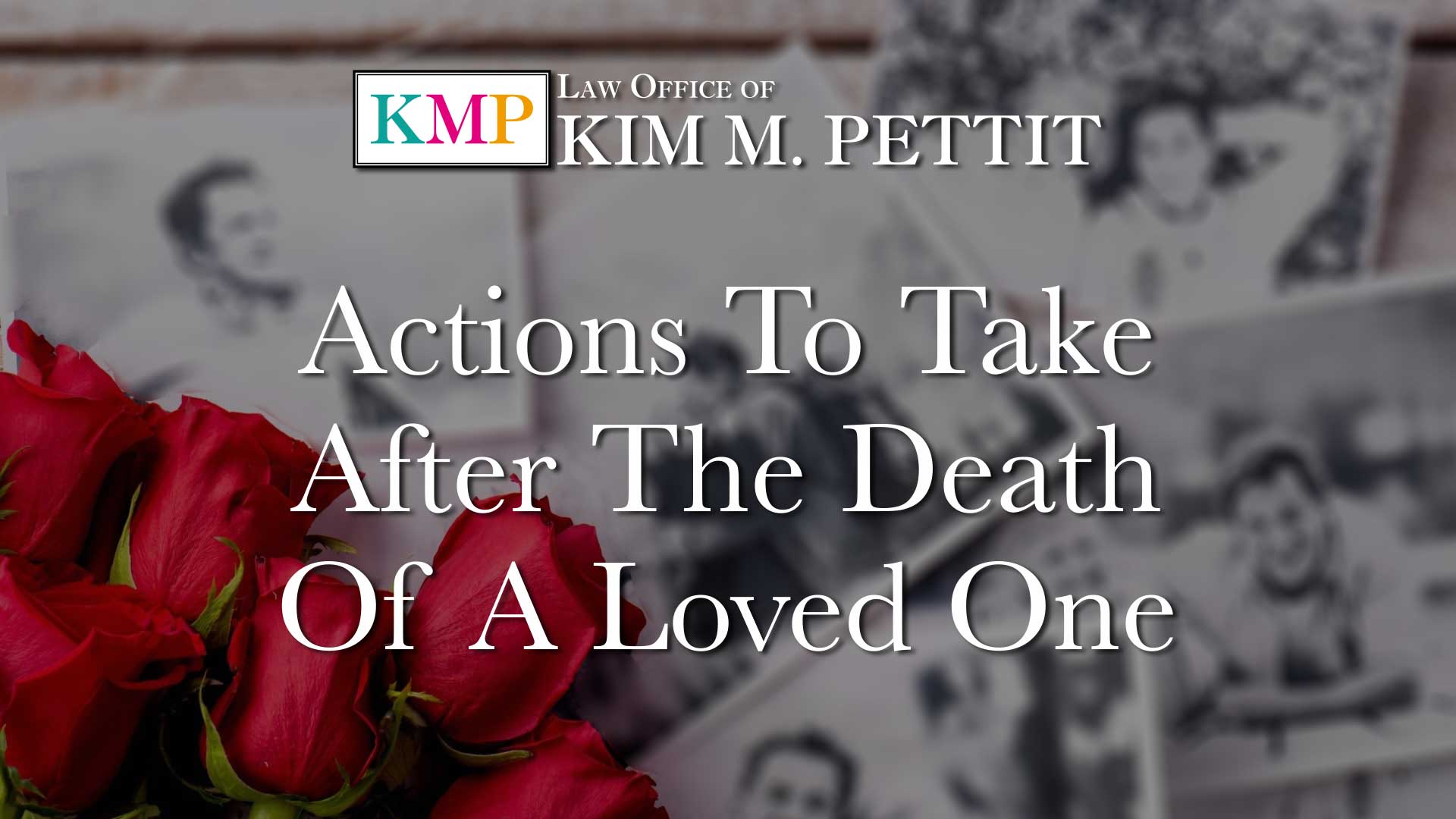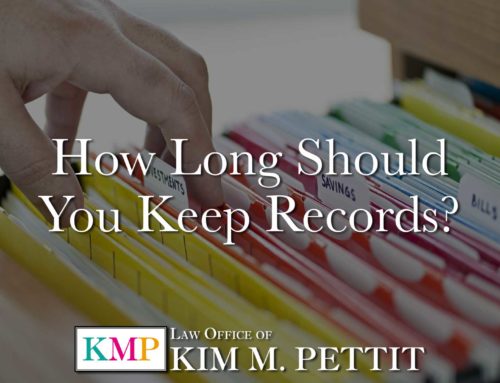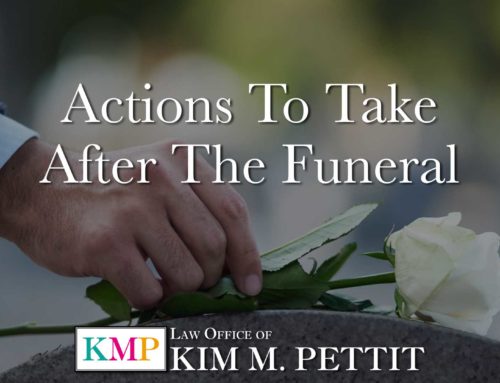You’ve just lost someone close to you. And in the midst of all the heartbreak and grief, there’s unnecessary stress. Why? Because now you’re in charge of settling the affairs of the deceased, and you aren’t sure what to do. You have no idea where any of the deceased’s records are. And funeral arrangements? What arrangements? You never got around to talking about that particular subject. Additionally, many questions are being asked about the deceased, and you have none of the answers. All of this added stress easily could’ve been avoided if you had just made time to talk about these things before it was too late.
Knowing what actions to take after the death of a loved one will save you a lot of time, effort, and stress down the road. Be aware of the location of important post-death documents and records for your loved ones. If you learn that a family member’s time is short, contact the person to learn (a) his or her desires about funeral arrangements (burial or cremation), (b) if the person is an organ donor, and (c) the location of records (will, birth certificate, Social Security card, life insurance policies, financial and retirement statements, credit card statements, keys to safe deposit box or combination to a safe at home).
If your loved one has not made a will or such documents as Medical Power of Attorney, Directive to Physicians, Declaration of Guardian, Do Not Resuscitate Order, or Financial Power of Attorney, encourage the person to make them now. The person should give a copy of the appropriate documents to his or her health care providers and family members or friends. Having access to these documents and records ahead of time will make the actions listed below easier to do.
Immediately Following the Death:
- Get a legal pronouncement of death.
- If he or she died at home under hospice care, call the hospice nurse, who can declare the death, and contact facilities to transport the body.
- If he or she died at home without hospice care, call 911 and have in hand a do-not-resuscitate document, if it exists. Without one, paramedics will start emergency procedures and, except where permitted to pronounce death, will take the person to an emergency room for a doctor to make the declaration.
- Arrange for organ or body donation, if applicable. Check his or her driver’s license or advanced health care directive. Contact a hospital immediately.
- Arrange for transportation of the body. Contact the funeral home. See if he or she had a prepaid burial plan.
- Contact immediate family members and close friends (ask them to contact others for you).
- Make immediate arrangements for the care of dependents and pets. Contact neighbors, friends, or church members for assistance.
- Contact his or her priest, minister, pastor, or rabbi.
- Notify religious, fraternal, and civic organizations that he or she was a member of.
- Plan funeral arrangements. Gather the following information on the deceased so that the funeral home can prepare the death certificate:
- First, middle, and last name
- Maiden name (if applicable)
- Home address, city, county, state
- Place of birth (city, state)
- Social Security # / Driver’s license #
- Date of birth
- Date of death
- Age on date of death
- Gender
- Marital status
- Spouse’s first and last name
- Father’s name
- Mother’s name
- If the Deceased was a veteran:
- Entered Service Date
- Entered Service Place
- Service Number
- Separated from Service Date
- Separated from Service Place
- Grade, Rank or Rating
- Organization and Branch of Service
- Is financial assistance needed for the funeral / burial / cremation?
- Will a union or fraternal organization help with the cost?
- Is there burial insurance?
- If the person was a veteran, contact the U. S. Department of Veterans Affairs website, or call Veterans Affairs at 1-844-698-2311 or the local veterans agency. Ask about veterans’ survivor benefits.
- Is the deceased to be buried?
- If the person is to be buried, will there be a casket? Opened or closed?
- Who will serve as pallbearers?
- Who will design the funeral program?
- Will there be a reception (meal, etc.) after the service?
- Where will the person be buried?
- Will you be respecting and following religious traditions for the deceased?
- Do you need to purchase a headstone?
- Will there be contributions to charities in lieu of flowers?
- Will you put an obituary in a newspaper?
- Is the deceased to be cremated?
- Where will you scatter the ashes?
- Will you be placing the ashes in an urn?
- Will you be burying the urn or placing it in a columbarium?
- If he or she was employed, contact the deceased’s employer. Ask for information about benefits, any pay that is due, and if there was a life insurance policy through the employer.
- Secure the deceased’s property. Remove any valuables from his or her home. Lock up his or her home and vehicle. Make it look like the home is occupied (for example, use lamp timers, turn on the TV/radio). And contact local law enforcement to drive by the home and check it periodically.
- Arrange for the disposal of any perishables left in the person’s home – such as food, refrigerated items, and trash. Water any plants.
- If the deceased has a landline telephone and an answering machine, check the messages.
- Notify the Post Office to forward the deceased’s mail. This will prevent mail from accumulating and attracting attention by potential thieves. Moreover, it will also inform you of subscriptions, creditors, and other accounts that need to be canceled.
- Furthermore, notify all three credit reporting agencies in order to minimize the chance of identity theft. Provide them with a copy of the death certificate. Follow-up about six weeks later to be sure no fraudulent accounts were opened.
- Equifax (1-866-349-5191)
- Experian (1-888-397-3742)
- TransUnion (1-800-916-8800)
Losing a loved one is always a time of great sorrow and heartache. Why add the stress of trying to figure out what to do immediately following the death of that person? Make things easy for yourself by talking with the other person about his or her desires and use the steps described above as a guideline. Be on the lookout for my next post on what actions to take after the funeral.
Let me help you with your and your family’s planning. If you are considering a will, medical power of attorney, directive to physicians, or a declaration of guardian for yourself or your children, please call the Law Office of Kim M. Pettit at (210) 558-4572 or request a consultation below. I look forward to helping you.






